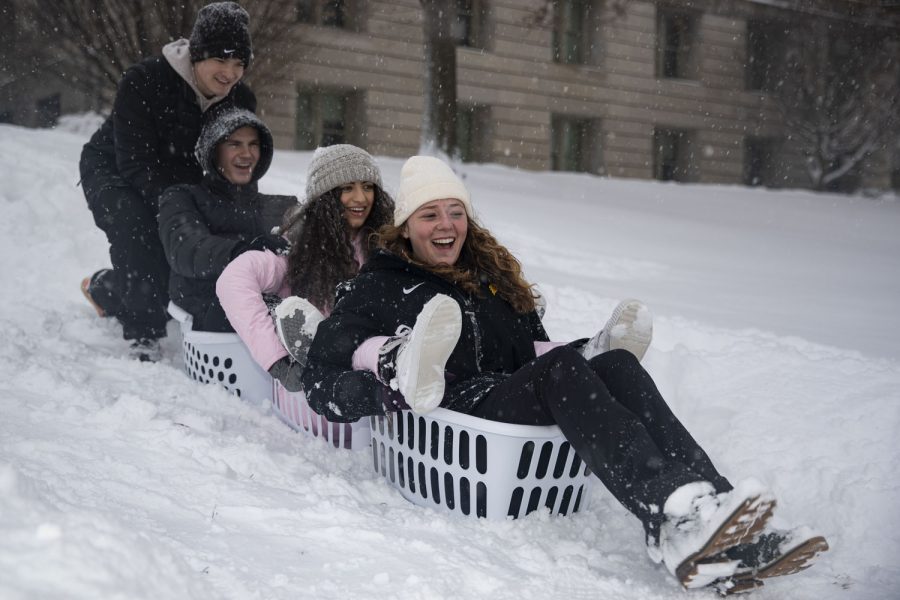Opinion | College living offers a sense of community
The community that college brings shouldn’t disappear after graduation.
University of Iowa students Eli Chow, Ethan Holter, Rose Bishay and Madeline Fait (left to right) sled on the Pentacrest on Thursday, Feb. 16, 2023. Several classes were canceled because of the weather. Snow totals in Iowa City were as high as 10.5 inches. Bishay said, “We went to Target, bought two five dollar buckets and decided to make the best out of the weather.” (Ayrton Breckenridge/The Daily Iowan)
March 7, 2023
College life is romanticized in the U.S. because of the sense of community students experience.
When my father recalls the best days of his life — the ones where the memories were the sweetest and jokes were the funniest — he starts his stories with, “It was back in college.” I can hear it now: my father speaking in his fading Southern accent as he shares the most compelling stories of blissfully all-American times.
It is rare to find a feeling of belonging and safety after college. Individualistic culture does not allow for easy access to community after college, which can take a toll on mental health post-grad. College provides a united sense of community that is absent in the rest of American society. It should not have to be this way.
The collectivity students experience at the University of Iowa can stem from many things. Whether it be sports culture or an on-campus club, it is easy to find something that suits one’s interests.
There are many resources at our fingertips here at the university. There are health clinics within walking distance, counseling services available for all students, and simply living within close proximity to friends and other like-minded students.
In many cultures, easy access to assets like these do not disappear outside of a college town.
Feeling connected to community, place, and purpose makes it easier to adjust to a new environment. Leaving an environment like this and not knowing where to turn when in need of assistance can have detrimental effects.
Studies show that post-college depression is increasingly common, though it is often mistreated, as it is not an official mental health diagnosis.
As a graduating senior this year, I have observed through conversations with my friends and classmates that feeling as though you do not have your life figured out plays a role in this potential depression as well.
There are many ways to battle this potential post-grad depression. The answers may sound simple, but it is all about getting motivated and involved.
Volunteering with youth, supporting local sports teams, and joining a class to learn a new hobby are all examples of ways to get involved within the community.
People often forget how much community matters until it is gone. Humans are social creatures, even those that tend to be more introverted are sometimes surprised by the effects a lack of community can have on them when it is no longer easily attainable.
When freshmen first start classes at the UI, many things can overwhelm them. It takes courage and vulnerability to reach within the community that is offered and gain something from it. After college, accessing the kind of courage needed as a freshman beginning their four-year journey of a lifetime can fulfill these psychological needs of collectiveness.
Community is important because it is how relationships are built and sustained. Figuring out the right ways to access it as an adult are different for everyone, but they should not be overlooked.
Columns reflect the opinions of the authors and are not necessarily those of the Editorial Board, The Daily Iowan, or other organizations in which the author may be involved.



